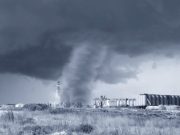(Singapore, 19 Jan 2025) A recent report warns that if political leaders fail to act immediately to decarbonize and restore nature, the global economy may lose 50% of its output between 2070 and 2090 due to catastrophic impacts of climate change.
The report, released on January 16 by the Institute and Faculty of Actuaries (IFoA) and scientists from the University of Exeter, calls on political leaders to accelerate actions against the climate crisis.
According to the report, without urgent measures to decarbonize, remove carbon from the atmosphere, and restore nature, the global economy could lose half of its economic output during the 20 years before 2090. If global temperatures rise by 3 degrees Celsius or more by 2050, the world could see more than 4 billion deaths, severe social and political divisions, state collapses, and species extinctions.

The report’s lead author, Torass, emphasized that no practical plans currently exist to prevent such outcomes. Some forecasts suggest that a 3-degree temperature rise would only lead to a 2% loss in global economic output, but Torass believes these predictions are incorrect and misleading, potentially causing political leaders to underestimate the harms their policies may bring.
Torass also highlights that financial institutions, political figures, and officials have been using imprecise climate risk assessments that overlook the expected severe impacts of climate change, such as tipping points, rising ocean temperatures, global warming-induced migration, and conflicts.
Given these threats, the risk of global “bankruptcy” is increasing, where the Earth’s systems deteriorate to the point that humanity can no longer access the essential services needed to sustain society and the economy.
Torass stated, “Nature is our cornerstone, providing us with food, water, air, and the raw materials and energy needed to drive the economy. The threats to this cornerstone could affect future human prosperity, and we must take action to stop it.”





































